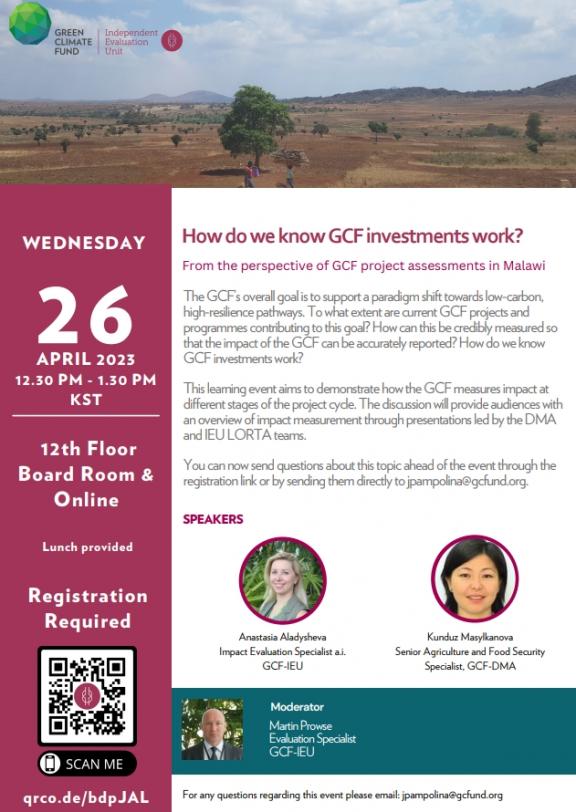Learning Talk: How do we know GCF investments work?
Hybrid
26 April 2023
The GCF’s overall goal is to support a paradigm shift towards low-carbon, high-resilience pathways. To what extent are current GCF projects and programmes contributing to this goal? How can this be credibly measured so that the impact of the GCF can be accurately reported? How do we know GCF investments work?
On 26 April, the IEU held a Learning Talk asking this very question: how do we know GCF investments work? The talk demonstrated how the GCF measures impact at different stages of the project cycle and took examples from FP002, a project based in Malawi, to centre the discussion. The event began with an overview of how the GCF assesses the impact potential of funding proposals with a presentation led by Kunduz Masylkanova, Senior Agriculture and Food Security Specialist at the DMA. This was followed by an introduction to the IEU’s Learning-Oriented Real Time Impact Assessment (LORTA) programme and how LORTA helps AEs assess the impact of GCF projects, presented by Anastasia Aladysheva, Impact Evaluation Specialist a.i. at the IEU.
Kunduz Masylkanova opened the talk by summarising how impact potential is measured as part of the GCF’s investment criteria. In this instance, assessments should examine climate rationale; the parameters used for vulnerability assessments; and the relevance of the prioritized adaptation measures to address the assessed vulnerability, risks and impacts. Taking FP002 as an example, Masylkanova noted the myriad tools available to the DMA to make such an assessment as well as the key issues affecting the accuracy of any assessment of impact potential.
These insights were complemented by the following presentation by Anastasia Aladysheva, which opened by highlighting the potential of impact evaluations and went on to describe LORTA’s first impact evaluation based on FP002 and its key results, policy implications, and learnings for M&E specialists. Results from the evaluation show that the project did lead to increases in farmers’ use of seasonal forecasts in agricultural decision-making and that there is an ongoing need to enhance access to climate and weather information through various communication channels.
Martin Prowse, Evaluation Specialist at the IEU and moderator of the event, then guided the panel discussion, which began between the panellists and then expanded to include audience members. Questions covered themes including measuring cost-efficiency, gender-related findings, and context-specific methodologies.
